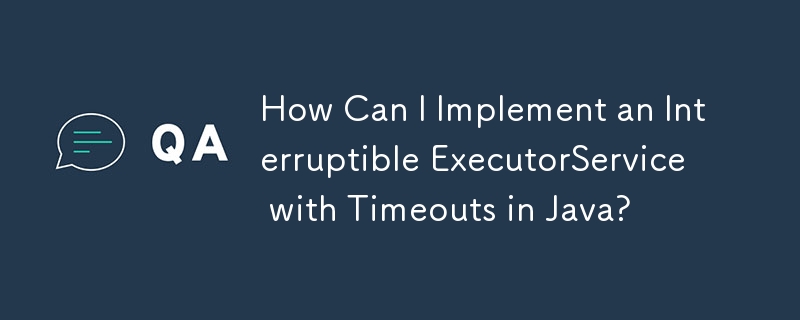Home >Java >javaTutorial >How Can I Implement an Interruptible ExecutorService with Timeouts in Java?
How Can I Implement an Interruptible ExecutorService with Timeouts in Java?
- Mary-Kate OlsenOriginal
- 2024-12-06 14:34:11334browse

Interruptible ExecutorService with Timeouts
When executing time-consuming tasks in parallel, it's essential to control execution timeouts to prevent tasks from indefinitely occupying resources. This article explores existing implementations of ExecutorServices that provide such timeout capabilities.
One solution is a customized ExecutorService, devised by contributors below, that monitors task execution and interrupts any exceeding a predefined timeout:
import java.util.List;
import java.util.concurrent.*;
public class TimeoutThreadPoolExecutor extends ThreadPoolExecutor {
// Timeout configuration
private final long timeout;
private final TimeUnit timeoutUnit;
// Task and timeout scheduling
private final ScheduledExecutorService timeoutExecutor = Executors.newSingleThreadScheduledExecutor();
private final ConcurrentMap<Runnable, ScheduledFuture> runningTasks = new ConcurrentHashMap<>();
// Initialize with timeout and scheduling options
public TimeoutThreadPoolExecutor(int corePoolSize, int maximumPoolSize, long keepAliveTime, TimeUnit unit, BlockingQueue<Runnable> workQueue, long timeout, TimeUnit timeoutUnit) {
super(corePoolSize, maximumPoolSize, keepAliveTime, unit, workQueue);
this.timeout = timeout;
this.timeoutUnit = timeoutUnit;
}
// ExecutorService lifecycle management
@Override
public void shutdown() {
timeoutExecutor.shutdown();
super.shutdown();
}
@Override
public List<Runnable> shutdownNow() {
timeoutExecutor.shutdownNow();
return super.shutdownNow();
}
// Monitor task execution and initiate timeouts
@Override
protected void beforeExecute(Thread t, Runnable r) {
if (timeout > 0) {
final ScheduledFuture<?> scheduled = timeoutExecutor.schedule(new TimeoutTask(t), timeout, timeoutUnit);
runningTasks.put(r, scheduled);
}
}
// Handle tasks after completion and cancel timeouts
@Override
protected void afterExecute(Runnable r, Throwable t) {
ScheduledFuture timeoutTask = runningTasks.remove(r);
if (timeoutTask != null) {
timeoutTask.cancel(false);
}
}
// Task responsible for interrupting long-running tasks
class TimeoutTask implements Runnable {
private final Thread thread;
public TimeoutTask(Thread thread) {
this.thread = thread;
}
@Override
public void run() {
thread.interrupt();
}
}
}
This custom implementation provides a convenient and efficient way to monitor task execution and enforce timeouts, ensuring predictable task behavior in multithreaded environments.
The above is the detailed content of How Can I Implement an Interruptible ExecutorService with Timeouts in Java?. For more information, please follow other related articles on the PHP Chinese website!
Related articles
See more- How to Inject Dependencies into Self-Instantiated Objects in Spring?
- How to Dynamically Add Files to the Java Classpath at Runtime?
- How to Calculate the Difference Between Two Dates in Days Using Android/Java?
- Why i created a lightweight mini spring alternative and how I did it
- How to Ensure Task Termination During Java ExecutorService Shutdown

